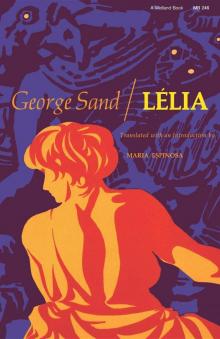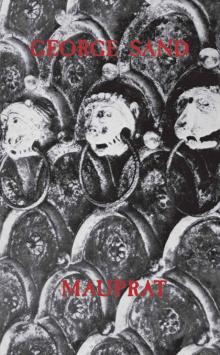- Home
- George Sand
Consuelo Page 2
Consuelo Read online
Page 2
"You possess at least one admirably endowed. Her organ is magnificent, her sentiment perfect, her skill remarkable—name her, then."
"Is it not so?" said the professor, evading the question; "did it not delight you?"
"It took my heart by storm—it even drew tears from me—and that by means so simple, combinations so little sought after, that at first I could hardly understand it. Then I remembered what you had so often told me touching your divine art, my dear master, and for the first time I understood how much you were in the right."
"And what did I say to you?" said the maestro, with an air of triumph.
"You told me," replied the count, "that simplicity is the essence of the great, the true, the beautiful in art."
"I also told you that there was often reason to observe and applaud what was clever, and brilliant, and well combined."
"Doubtless; but between these secondary qualities and the true manifestations of genius, there was an abyss, you said. Very well, dear maestro: your cantatrice is alone on one side, while all the rest are on the other."
"It is not less true than well expressed," observed the professor, rubbing his hands.
"Her name?" replied the count.
"What name?" rejoined the malicious professor.
"Oh, per Dio Santo! that of the siren whom I have just been hearing."
"What do you want with her name, Signor Count?" replied Porpora, in a tone of severity.
"Why should you wish to make a secret of it, maestro?"
"I will tell you why, if you will let me know what object you have in finding out."
"Is it not a natural and irresistible feeling to wish to see and to know the objects of our admiration?"
"Ah! that is not your only motive. My dear Count, pardon me for thus contradicting you, You are a skillful amateur and a profound connoisseur in music, as every body knows; but you are, over and above all, proprietor of the theater of San Samuel. It is your glory and your interest alike, to encourage the loftiest talent and the finest voices of Italy. Yon know that our instruction is good, and that with us alone those studies are pursued which form great musicians. You have already carried off Corilla from me, as she will one day be carried off from you by an engagement in some other theater; so you are come to spy about, to see if you can't get a hold of some other Corilla—if, indeed, we have formed one. That is the truth, Signor Count, you must admit."
"And were it even so, dear maestro," replied the count, smiling, "what would it signify to you?—where is the harm?"
"It is a great deal of harm, Signor Count. Is it nothing to corrupt, to destroy these poor creatures?"
"Ha! my most austere professor, how long have you been the guardian angel of their tender virtues?"
"I know very well, Signor Count, I have nothing to do with them, except as regards their talent, which you disfigure and disgrace in your theaters by giving them inferior music to sing. Is it not heart-rending—is it not shameful—to see Corilla, who was just beginning to understand our serious art, descend from the sacred to the profane—from prayer to badinage—from the altar to the boards—from the sublime to the absurd—from Allegri and Palestrina to Albinoni and the barber Apollini?"
"So you refuse, in your severity, to name a girl respecting whom I can have no intention, seeing that I do not know whether she has the necessary qualifications for the theater?"
"I absolutely refuse."
"And do you suppose I shall not find it out?"
"Alas! you will do so if you are bent upon it, but I shall do my utmost to prevent you from taking her from us."
"Very well, maestro, you are half conquered, for I have seen her—I have divined your mysterious divinity."
"So, so," replied the master, with a reserved and distrustful air; "are you sure of that?"
"My eyes and my heart have alike revealed her to me, and, that you may be convinced, I shall describe her to you. She is tall—taller, I think, than any of your pupils—fair as the snow on Friuli, and rosy as the dawn of a summer morn; she has flaxen hair, azure eyes, an exquisitely rounded form, with a ruby on her finger which burned my hand as I touched it, like sparks from a magic fire."
"Bravo!" exclaimed Porpora, with a cunning air; "in that case I have nothing to conceal. The name of your beauty is Clorinda. Go and pay your court to her; gain her over with gold, with diamonds, and gay attire. You will easily conclude an engagement with her. She will help you to replace Corilla; for the public of your theater always prefer fine shoulders to sweet sounds, flashing eyes to a lofty intellect."
"Am I then mistaken, my dear maestro?" said the count, a little confused; "and is Clorinda but a commonplace beauty?"
"But suppose my siren, my divinity, my angel, as you are pleased to call her," resumed the maestro, maliciously, "was anything but a beauty?"
"If she be deformed, I beseech you not to name her, for my illusion would be too cruelly dissipated. If she were only ugly, I could still adore her; but I should not engage her for the theater, because talent without beauty is a misfortune, a struggle, a perpetual torment for a woman. What are you looking at, maestro, and why do you pause?"
"Why? because we are at the water-steps, and I see no gondola. But you, Count, what do you look at?"
"I was looking to see if that young fellow on the steps there, beside that plain little girl, was not my protegé, Anzoleto, the handsomest and most intelligent of all our little plebeians. Look at him, dear maestro. Do you not, like me, feel interested in him? That boy has the sweetest tenor in Venice, and he is passionately fond of music, for which he has an incredible aptitude. I have long wished to speak to you about it, and to ask you to give him lessons. I look upon him as the future support of my theater, and hope in a few years to be repaid for all my trouble. Hola, Zoto! come hither, my child, that I may present you to the illustrious master Porpora."
Anzoleto drew his naked legs out of the water, where they hung carelessly while he amused himself stringing those pretty shells which in Venice are poetically termed fioro di mare. His only garments were a pair of well-worn pantaloons and a fine shirt, through the rents of which one could see his white shoulders, modeled like those of a youthful Bacchus. He had all the grace and beauty of a young Fawn, chiseled in the palmiest days of Grecian art; and his features displayed that singular union, not unfrequent in the creations of Grecian statuary, of careless irony with dreamy melancholy. His fine fair hair, somewhat bronzed by the sun, clustered in Antinöus-like curls about his alabaster neck; his features were regular and beautifully formed; but there was something bold and forward in the expression of his jet-black eyes which displeased the maestro. The boy promptly rose when he heard the voice of Zustiniani, pitched his shells into the lap of the little girl beside him, who without raising her eyes went on with her occupation of stringing them along with golden beads, and coming forward, kissed the count's hand, after the fashion of the country.
"Upon my word, a handsome fellow!" said the professor, giving him a tap on the cheek; "but he seems occupied with amusements rather childish for his time of life: he is fully eighteen years old, is he not?"
"Nineteen shortly, Sior Professor," replied Anzoleto in the Venetian dialect; "but if I amuse myself with shells it is to help little Consuelo here to make her necklaces."
"Consuelo," said the master, advancing toward his pupil with the count and Anzoleto, "I did not imagine that you cared for ornaments."
"Oh, it is not for myself, Signor," replied Consuelo, rising cautiously to prevent the shells falling from her lap; "I make them for sale in order to procure rice and Indian corn."
"She is poor and supports her mother," said Porpora. "Listen, Consuelo: should you find yourself in any difficulty, be sure to come and see me: but I absolutely forbid you to beg, remember."
"Oh, you need not forbid her, Sior Professor," replied Anzoleto with animation; "she will never do so; and beside I would prevent her."
"But you have nothing," said the count.
"Noth
ing but your liberality, Eccellenza; but we share together, the little one and myself."
"She is a relative, then?"
"No; she is a stranger—it is Consuelo."
"Consuelo! what a singular name!" said the count.
"A beautiful name, Eccellenza," resumed Anzoleto; "it means Consolation."
"Oh, indeed? She is your friend then, it appears?"
"She is my betrothed, Signor."
"So soon? Such children! to think of marriage already!"
"We shall marry on the day that you sign my engagement at San Samuel, Eccellenza."
"In that case you will have to wait a long time, my little ones."
"Oh, we shall wait," replied Consuelo, with the cheerful gaiety of innocence."
The count and the maestro amused themselves for some time longer with the frank remarks and repartees of the young couple; then having arranged that Anzoleto should give the professor an opportunity of hearing his voice in the morning, they separated, leaving him to his serious occupations.
"What do you think of that little girl?" said the professor to Zustiniani.
"I saw her but an instant, and I find her sufficiently ugly to justify the maxim, that in the eyes of a youth of eighteen every woman is handsome."
"Very good," rejoined the professor; "now permit me to inform you that your divine songstress, your siren, your mysterious beauty, was no other than Consuelo."
"What! that sooty creature? that dark and meager grasshopper? Impossible, maestro!"
"No other, Signor Count. Would she not make a fascinating prima donna?"
The count stopped, looked back, and clasping his hands while he surveyed Consuelo at a distance, exclaimed in mock despair, "Just Heaven! how canst thou so err as to pour the fire of genius into heads so poorly formed?"
"So you give up your culpable intentions?" said the professor.
"Most certainly."
"You promise me?" added Porpora.
"Oh, I swear it," replied the count.
CHAPTER III
BORN in sunny Italy, brought up by chance like a seabird sporting on its shores, poor, an orphan, a castaway, and nevertheless happy in the present and confiding in the future, foundling as he doubtless was—Anzoleto, the handsome youth of nineteen who spent his days with little Consuelo in perfect freedom on the footways of Venice, was not as might be supposed in his first love. Too early initiated, he would perhaps have been completely corrupted and worn out, had he dwelt in our somber climate, or had nature endowed him with a feebler organization. But early developed and destined to a long and powerful career, his heart was pure and his senses were restrained by his will. He had met the little Spaniard by chance, singing hymns before the Madonette; and for the pleasure of exercising his voice he had joined her for hours together beneath the stars. Then they met upon the sands of the Lido to gather shell-fish, which he eat, and which she converted into chaplets and other ornaments. And then again they had met in the churches, where she prayed with all her heart, and where he gazed with all his eyes at the fine ladies. In all these interviews Consuelo had appeared to him so good, so sweet, so obliging, and so gay, that she had become his inseparable friend and companion—he knew not very well how or why. Anzoleto had known the joys of love. He felt friendship for Consuelo; and as he belonged to a country and a people where passion reigns over every other feeling, he knew no other name for this attachment than that of love. Consuelo admitted this mode of speaking after she had addressed Anzoleto as follows: "If you are my lover, it is then with the intention of marrying me?" To which he replied: "Certainly, if you wish it we shall marry each other." From that moment it was a settled affair. Possibly Anzoleto was amusing himself, but to Consuelo it was matter of firm conviction. Even already his young heart experienced those contradictory and complicated emotions which agitate and discompose the existence of those who love too early.
Given up to violent impulses, greedy of pleasure, loving only what promoted his happiness, hating and avoiding every thing which opposed his gratifications, at heart an artist—that is to say, feeling and reveling in life with frightful intensity—he soon found that his transient attachments imposed on him the sufferings and dangers of a passion which he did not really feel; and he experienced the want of sweet companionship and of a chaste and tranquil outlet to his feelings. Then, without understanding the charm which drew him to Consuelo—having little experience of the beautiful—hardly knowing whether she was handsome or ugly—joining for her sake in amusements beneath his age—he led with her in public, on the marble floors and on the waters of Venice, a life as happy, as pure, as retired, and almost as poetic, as that of Paul and Virginia in the recesses of the forest. Although they enjoyed unrestrained liberty—no watchful, tender parents to form them to virtue—no devoted attendant to seek them and bring them back to the bosom of their homes—not even a dog to warn them of danger—they never experienced harm. They skimmed over the waters of the lagunes in all times and seasons in their open boat, without oars or pilot; they wandered over the marshes without guide, without watch, and heedless of the rising waters; they sang before the vine-covered chapels at the corners of the streets without thinking of the hour, and sometimes with no other couch than the white tiles, still warm with the summer rays. They paused before the theater of Punchinello, and followed with riveted attention the fantastic drama of the beautiful Corisanda, queen of the puppet show, without thinking of their breakfast or the little probability there was of supper. They enjoyed the excesses of the carnival, he with his coat turned inside out, she with a bunch of old ribbons placed coquettishly over her ear. They dined sumptuously—sometimes on the balustrades of a bridge or on the steps of a palace—on shell-fish, fennel stalks, and pieces of citron. In short, they led a free and joyous life, without incurring more risk, or feeling more emotion, than might have been experienced by two young people of the same age and sex. Days, years passed away. Anzoleto formed other connections, while Consuelo never imagined that he could love any one but her. She became a young woman without feeling it necessary to exercise any further reserve with her betrothed; while he saw her undergo this transformation without feeling any impatience, or desiring to change this intimacy, free as it was at once from scruple, mystery, or remorse.
It was already four years since Professor Porpora and Zustiniani had mutually introduced their little musicians, and during this period the count had never once thought of the young chorister. The professor had likewise forgotten the handsome Anzoleto, inasmuch as he had found him endowed with none of the qualities desirable in a pupil—to wit, a serious, patient disposition, absolute submission to his teacher, and complete absence of all musical studies before the period of his instruction. "Do not talk to me," said he, "about a pupil whose mind is any thing else than a tabula rasa, or virgin wax, on which I am to make the first impression. I cannot afford to give up a year to unteach what has been learned before. If you want me to write, give me a clear surface, and that too of a good quality. If it be too hard I can make no impression on it, if too soft I shall destroy it at the first stroke." In short, although he acknowledged the extraordinary talents of the young Anzoleto, he told the count with some temper and ironical humility, at the end of his first lesson, that his method was not adapted to a pupil so far advanced, and that a master could only embarrass and retard the natural progress and invincible development of so superior an organization.
The count sent his protegé to Professor Mellifiore, who with roulades and cadences, modulations and trills, so developed his brilliant qualities, that at twenty-three he was considered capable, in the opinion of all those who heard him in the saloons of the court, of coming out at San Samuel in the first parts. One evening the dilettanti, nobility, and artists of repute then in Venice, were requested to be present at a final and decisive trial. For the first time in his life Anzoleto doffed his plebeian attire, put on a black coat, a satin vest, and with curled and powdered hair and buckles in his shoes, glided over with a composed a
ir to the harpsichord, where amid the glare of a hundred wax-lights and under the gaze of two or three hundred persons, he boldly distended his chest, and made the utmost display of powers that were to introduce him into a career where not one judge alone, but a whole public, held the palm in one hand and downfall in the other.
We need not ask whether Anzoleto was secretly agitated. Nevertheless, he scarcely allowed his emotion to be apparent; and hardly had his piercing eyes divined by a stealthy glance the secret approbation which women rarely refuse to grant to so handsome a youth—hardly had the amateurs, surprised at the compass of his voice and his facility of expression, uttered a few faint murmurs of applause—when joy and hope flooded his whole being. For the first time Anzoleto, hitherto ill-instructed and undervalued, felt that he was no common man; and transported by the necessity and the consciousness of success, he sang with an originality, an energy, and skill, that were altogether remarkable. His taste to be sure was not always pure, nor his execution faultless; but he was always able to extricate himself by his boldness, his intelligence, and enthusiasm. He failed in effects which the composer had intended, but he realized others which no one ever thought of—neither the author who composed, the professor who interpreted, nor the virtuoso who rehearsed them. His originality took the world by storm. For one innovation his awkwardness was pardoned, and for an original sentiment they excused ten rebellions against method. So true it is that in point of art the least spark of genius—the smallest flight in the direction of new conquests—exercises a greater fascination than all the resources and lights of science within known limits.
Nobody, perhaps, was able to explain these matters, and nobody escaped the common enthusiasm. Corilla began by a grand aria, well sung and loudly applauded: yet the success of the young débutant was so much greater than her own, that she could not help feeling an emotion of anger. But when Anzoleto, loaded with caresses and praises, returned to the harpsichord where she was seated, he said, with a mixture of humility and boldness, "And you, queen of song and queen of beauty! have you not one encouraging look for the poor unfortunate who fears and yet adores you?" The prima donna, surprised at so much assurance, looked more closely at the handsome countenance which till then she had hardly deigned to notice—for what vain and triumphant woman cares to cast a glance on the child of obscurity and poverty? She looked, and was struck with his beauty. The fire of his glances penetrated her soul; and, vanquished, fascinated in her turn, she directed toward him a long and earnest gaze, which served to seal his celebrity. In this memorable meeting Anzoleto had led the public, and disarmed his most redoubtable adversary; for the beautiful songstress was not only queen of the stage, but at the head of the management, and of the cabinet of Count Zustiniani.

 Lelia
Lelia Mauprat
Mauprat Valentine
Valentine The Countess von Rudolstadt
The Countess von Rudolstadt Laura
Laura Indiana (Oxford World's Classics)
Indiana (Oxford World's Classics)